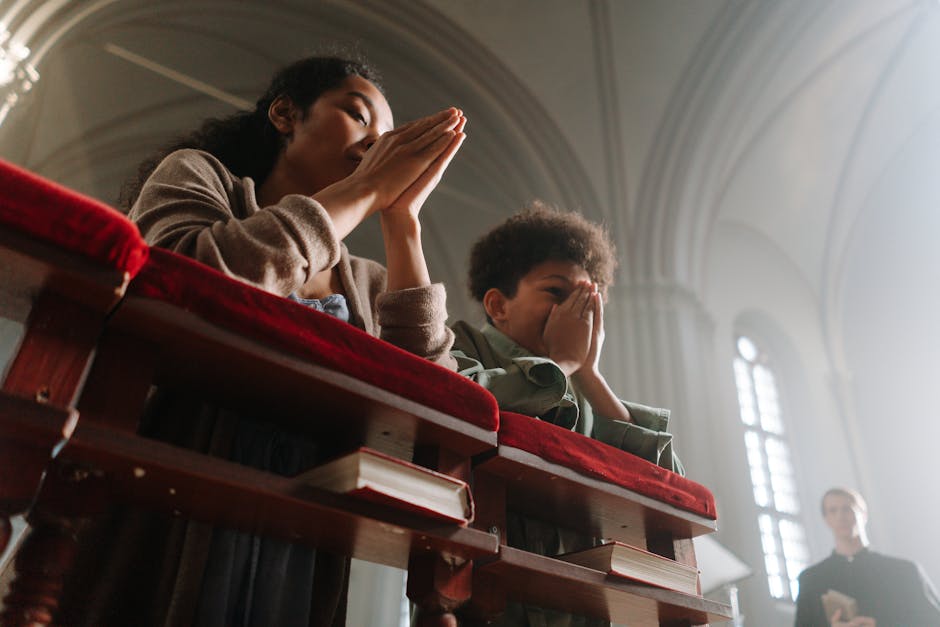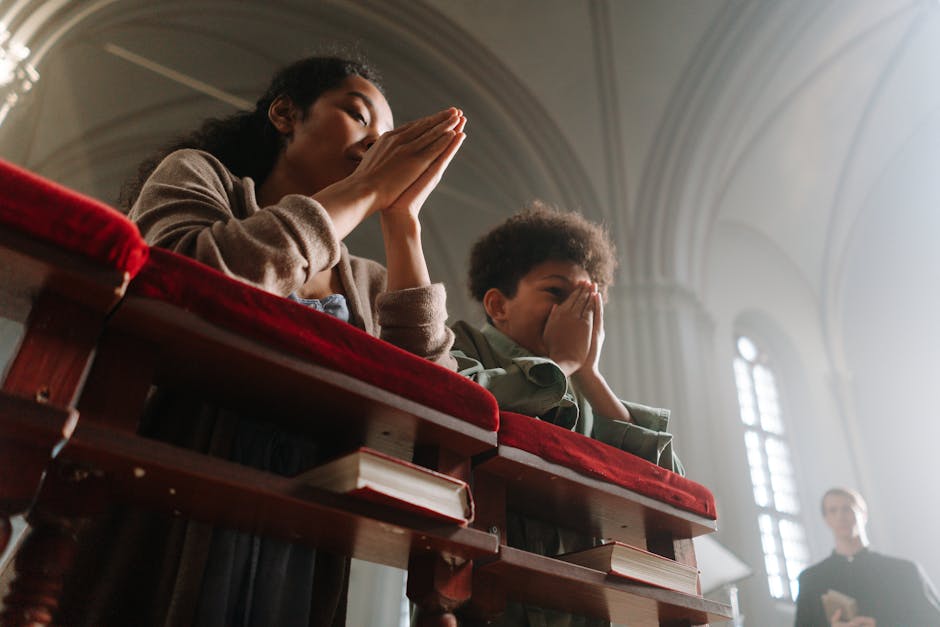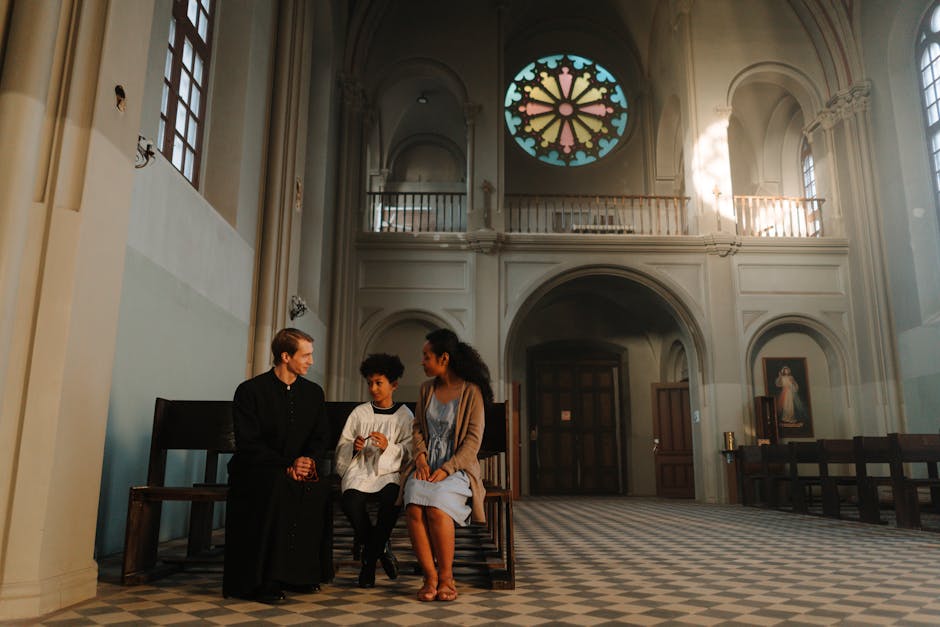The Three Arenas of a Living Faith
The Catholic life is not a theory but a tangible reality, lived out in our connection to the universal Church, our commitment to our local parishes, and our conscientious presence in the world. Recent events beautifully illustrate these three arenas of witness: a powerful gesture of solidarity with Christians in the Holy Land, a courageous pastoral plan to renew a diocesan mission, and a principled stand for truth and charity in the public square.
A Universal Heart: Solidarity with the Church Abroad
The Body of Christ is a single organism, and when one part suffers, every part suffers with it. This truth is powerfully expressed when American Catholics open their hearts to the Christians of the Holy Land. The Latin Patriarch of Jerusalem, whose office has shepherded the faithful in the lands of Our Lord for centuries, carries a heavy burden. He is responsible not only for the sacred sites but for the “living stones”—the communities of faith in Israel, Palestine, Jordan, and Cyprus who face immense pastoral, educational, and humanitarian challenges.
When a leader like the Patriarch visits a diocese in the United States, it is more than a fundraising tour; it is an encounter of hope. Such visits bridge continents, transforming abstract headlines into a personal appeal from one part of the family to another. By offering financial and spiritual support, local communities participate directly in the mission to sustain the Church where it was born. This is solidarity in action, a recognition that our faith calls us to look beyond our own borders and accompany our brothers and sisters who keep the flame of faith alive in difficult circumstances. It is a powerful reminder that the Church’s mission is one, shared across cultures and great distances.
Bear one another’s burdens, and so you will fulfill the law of Christ. (Gal 6:2)
Prudent Stewardship: Tending the Garden at Home
While our vision must be global, our responsibilities begin at home. Many dioceses across the nation are grappling with a landscape of change. Shifting demographics, a decline in Mass attendance, and a smaller number of priests present a serious challenge. One major archdiocese, for example, is facing the reality that its structures were built for a Catholic population nearly double its current size. With fewer priests to serve its parishes and a majority of its faith communities shrinking, the temptation could be to despair.
But faith sees this moment not as an end, but as an invitation from God to reimagine how the Church carries out its mission. This requires immense courage and prudent stewardship. The difficult work of restructuring is like tending a vast garden. It involves careful assessment, listening to the needs of the soil, and sometimes making painful decisions to prune back what is overgrown so that new, healthier growth can emerge. By consolidating resources, forming parishes into collaborative families, and focusing on mission rather than maintenance, diocesan leaders and laity can cultivate more vibrant communities. This work, undertaken with prayerful discernment and collaboration, is an act of profound hope, ensuring that the gifts of the Gospel can be shared effectively with future generations.
A Conscience in the Public Square: The Virtue of Principled Speech
The Catholic vocation extends beyond the church walls and into the often-turbulent arena of public life. Here, the challenge is to be salt and light, engaging in dialogue with both truth and charity. A recent example highlights this delicate task. A prominent Catholic philosopher resigned from the board of a public policy think tank after its leadership was perceived to have handled a controversy involving antisemitic rhetoric poorly.
This decision was not an act of condemnation but of conscience. While acknowledging the good intentions of the organization’s leader, the scholar chose to step away, modeling that principled disagreement is sometimes necessary. His actions remind us of several key duties for Catholics in public life. First is the unwavering obligation to stand against bigotry in all its forms. Second is the capacity for charitable critique, which allows one to challenge a decision or an idea without destroying a relationship. The philosopher’s witness demonstrates that it is possible to hold firm convictions while also acknowledging our own human fallibility. This is the narrow path of a faithful public witness: to engage, to critique honestly, and to act with a well-formed conscience, always seeking to build up rather than tear down.
Let your speech always be gracious, seasoned with salt, so that you may know how you ought to answer each person. (Col 4:6)
Putting Virtue into Practice
These examples from the universal Church, a local diocese, and the public square offer a blueprint for our own lives. The virtues of solidarity, stewardship, and principled charity can be cultivated in our families, workplaces, and communities through intentional practices.
| Practice | Where to Apply | Why It Serves the Common Good | First Small Step |
|---|---|---|---|
| Global Solidarity | Family prayer, parish collections, personal almsgiving | Strengthens the universal Body of Christ and supports human dignity worldwide. | Include a specific prayer for persecuted Christians in your grace before meals this week. |
| Prudent Stewardship | Family budgets, parish finance councils, business management | Ensures that resources are used effectively for mission and service, not just maintenance. | Review your parish’s annual report to understand its financial health and missionary priorities. |
| Active Listening | Parish meetings, workplace disagreements, conversations with teenagers | Builds the trust and mutual understanding necessary for authentic communion and problem-solving. | In your next important conversation, try to summarize the other person’s point of view before stating your own. |
| Principled Dialogue | Social media, community forums, political discussions | Upholds both truth and charity, protecting public discourse from hatred and division. | Before posting a comment online, read it aloud and ask, “Is this both true and charitable?” |
| Courageous Discernment | Career choices, volunteer commitments, parish planning | Aligns our actions with God’s will, even when it requires sacrifice or change. | Set aside 15 minutes to prayerfully consider one major decision you are facing. |
A Checklist for Faithful Action
Here are a few ways to translate these principles into concrete actions in your own life:
- Participate fully in any listening sessions or planning initiatives happening in your own parish or diocese.
- Seek out reliable information about the needs of Christian communities in places of conflict or poverty.
- Identify one public conversation where you can contribute a voice of reason, charity, and well-informed faith.
- Initiate a difficult but necessary conversation with a friend or family member, focusing on seeking understanding rather than winning an argument.
- Examine how your personal, family, or business spending reflects a commitment to the mission of the Church, both at home and abroad.
From the ancient streets of Jerusalem to the parish halls of our neighborhoods and the digital expanse of the modern world, our call is the same. It is a summons to live our faith with integrity, courage, and a love that embraces both our closest neighbor and our brother or sister across the globe. By cultivating these virtues, we not only strengthen the Church but also become more credible witnesses of the Gospel, offering a message of hope, unity, and truth to a world that desperately needs it.




